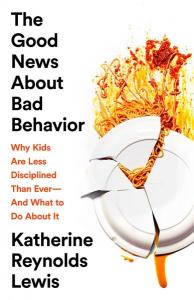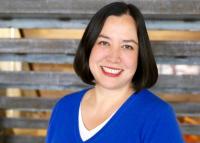Lewis: Good News About Bad Behavior
For this column, NASW book editor Lynne Lamberg asks NASW authors to tell how they came up with the idea for their book, developed a proposal, found an agent and publisher, funded and conducted research, and put the book together. She also asks what they wish they had known before they began working on their book, what they might do differently the next time, and what tips they can offer aspiring authors. She then edits the A part of that Q&A to produce the author reports you see here. Publication of NASW members’ reports in Advance Copy does not constitute NASW’s endorsement of their books. NASW welcomes your comments, and hopes this column stimulates productive discussions.
THE GOOD NEWS ABOUT BAD BEHAVIOR:WHY KIDS ARE LESS DISCIPLINED THAN EVER —
AND WHAT TO DO ABOUT IT
Katherine Reynolds Lewis
PublicAffairs (Hachette Book Group), April 17, 2018, $28
ISBN-10: 1610398386; ISBN-13: 9781610398381
ISBN ebook: 9781610398
Lewis reports:
A new and surprising problem has quietly developed in the current generation of children: They are out of control. In a recent study, first-graders could stand still for only three minutes, versus twelve for their peers in 1948. Half of all children develop a mood or behavioral disorder or substance addiction by age 18, according to NIH.
In the era of the helicopter parent, children seem to have lost the ability to regulate their behavior, thoughts, and emotions. I argue that our time-honored methods of punishments and rewards haven't taught discipline — they've undermined it.
The book grows out of my fascination with school discipline and the work of psychologist Ross Greene. When I heard how his model of discipline was changing the lives of children in psychiatric wards, juvenile justice facilities, and schools, I flew to Maine to shadow him and schools using his model.
I then pitched a freelance story to Mother Jones magazine. Within days of appearing online in July 2015, the article became the site’s most-read story ever, with more than 6 million views to date. Clearly, millions of people were facing the same fears, confronting the same problems, and looking for solutions.Fired up, I wrote to my six “dream” agents asking to meet about a possible book. I chose the one who seemed the best fit. He helped me rework a draft book proposal and the following summer received multiple offers from publishers. Up to this point, I had self-funded my reporting. With a book advance, I crisscrossed the country following psychologists, teachers and families, and delivered a manuscript 10 months later.
While they didn’t provide funding, I was helped by writing residencies, including the Carey Institute, Ragdale, and the Virginia Center for the Creative Arts.
My biggest lesson learned is to be dogged and unafraid to ask for meetings with agents or publishers when your research shows they’d be a good fit. You also have to be flexible and responsive to feedback from publishing industry professionals about the market. My only regret is not having more time to prepare for the book launch.
Contact info:
- Katherine Reynolds Lewis, 301-375-0675, Katherine@KatherineRLewis.com, Twitter: @KatherineLewis
- Book and blog website: http://KatherineRLewis.com/
- Agent: Richard S. Pine: 212-922-1668; http://www.inkwellmanagement.com
- Publicist: Jaime Leifer, 212-364-0684, jaime.leifer@hbgusa.com
NASW members: will your book be published soon? Take advantage of this opportunity for shameless self-promotion. Submit your report for Advance Copy.
Tell your fellow NASW members how you came up with the idea for your book, developed a proposal, found an agent and publisher, funded and conducted research, and put the book together. Include what you wish you had known before you began working on your book, or had done differently.
See https://www.nasw.org/advance-copy-submission-guidelines.
Thinking of writing a book? If you are a NASW member, you may access a list of more than 150 books and online resources to help you craft your book proposal, find an agent and funding sources, negotiate your contract, learn about self-publishing, publicize and market your book, and more at https://www.nasw.org/article/write-book.
Send book info and questions about book publishing to Lynne Lamberg, NASW book editor, llamberg@nasw.org.


